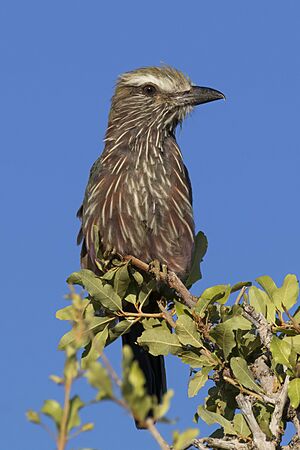Purple roller facts for kids
- The name "purple roller" can also refer to the azure dollarbird (Eurystomus azureus) of Indonesia.
Quick facts for kids Purple roller |
|
|---|---|
 |
|
| Etosha National Park, Namibia | |
| Conservation status | |
| Scientific classification |
|
| Kingdom: | Animalia |
| Phylum: | Chordata |
| Class: | Aves |
| Order: | Coraciiformes |
| Family: | Coraciidae |
| Genus: | Coracias |
| Species: |
C. naevius
|
| Binomial name | |
| Coracias naevius Daudin, 1800
|
|
| Script error: The function "autoWithCaption" does not exist. | |
| Synonyms | |
|
|
Script error: No such module "Check for conflicting parameters".
The purple roller (Coracias naevius), also called the rufous-crowned roller, is a cool bird found all over Sub-Saharan Africa. It's a medium-sized bird. Compared to its relatives, the other rollers, its colors are not as bright. Its voice can sound a bit rough.
Contents
What is a Purple Roller?
The purple roller is the biggest bird in the roller family. It can grow to be about 35 to 40 centimeters (14 to 16 inches) long. Adult purple rollers usually weigh between 145 to 200 grams (5 to 7 ounces).
From far away, this bird looks mostly brownish. It has a white stripe above its eye and a white patch on the back of its neck. Its tail is dark and square-shaped. Birds living in the northern parts of Africa often have a reddish-brown top of the head. Those in the south have a more olive-green head. The feathers on its belly are purplish-pink with white streaks. Its wings are long and rounded.
What Does it Sound Like?
The purple roller has a loud and rough call. It sounds like "ka" or "gaa". It repeats this sound quickly and evenly.
Where Do Purple Rollers Live?
Purple rollers live across a large area of Sub-Saharan Africa. This includes countries like Senegal, Gambia, Somalia, Tanzania, Angola, Democratic Republic of Congo, Namibia, and South Africa.
Types of Purple Rollers
There are two main types, or subspecies, of the purple roller:
- The Lilac-throated roller (C. n. naevius): This type is found from Senegal and Gambia all the way to Somalia and northern Tanzania.
- The C. n. mosambicus: This type lives from Angola and southern Democratic Republic of Congo down to Namibia and northern South Africa.
Purple Roller Behavior
Purple rollers love dry areas with thorny bushes and trees. They often sit high up on thorn trees or poles. From these high spots, they watch for their food on the ground. They eat insects, spiders, scorpions, and even small lizards.
Flying and Display
When a purple roller wants to show off, it does a special display flight. It rocks back and forth while flying. It also makes its loud calls during this time. It starts flying high above the trees. Then, it dives down towards the ground in a rolling flight.
Home and Territory
Purple rollers are very protective of their space. During the time they are raising their young, they will chase away other rollers, small hawks, and even crows from their territory.
Reproduction and Life Cycle
Purple rollers seem to breed when the conditions are right, often after it rains. This means their breeding season can change depending on where they live.
They make their nests in natural holes in trees. They might also use old holes made by woodpeckers. Sometimes, they nest in cliffs, riverbanks, pipes, or holes in buildings. The female usually lays three white eggs. Both the mother and father bird take turns sitting on the eggs to keep them warm. They also both help feed the young birds once they hatch.
 | Sharif Bey |
 | Hale Woodruff |
 | Richmond Barthé |
 | Purvis Young |


